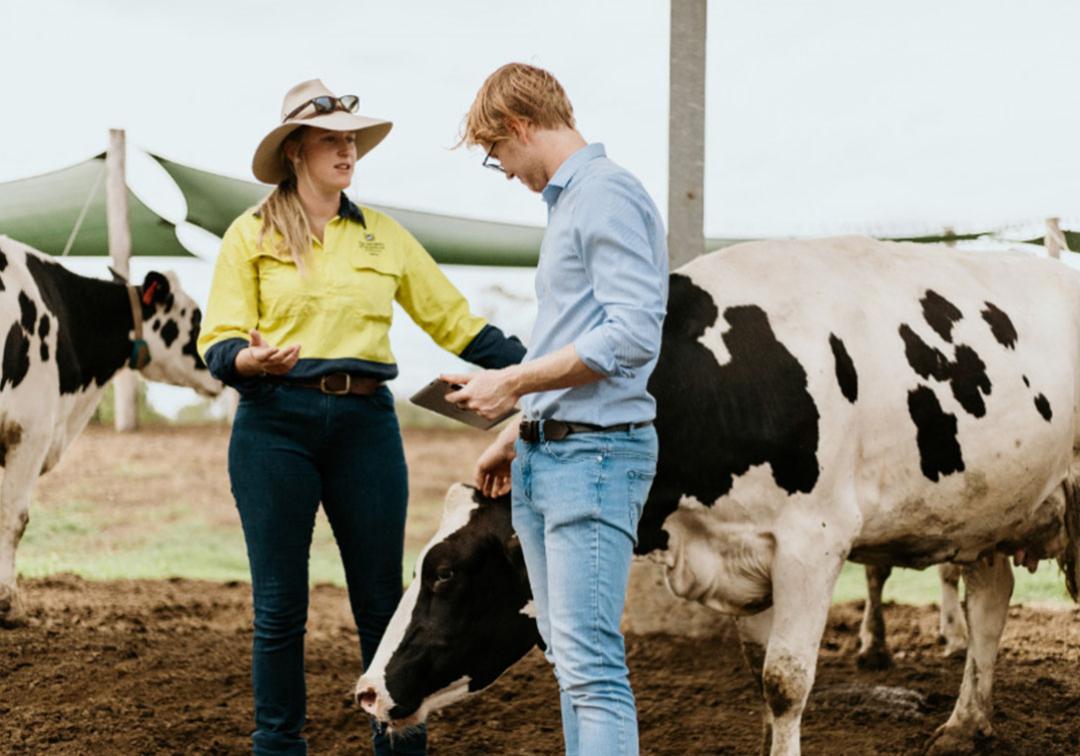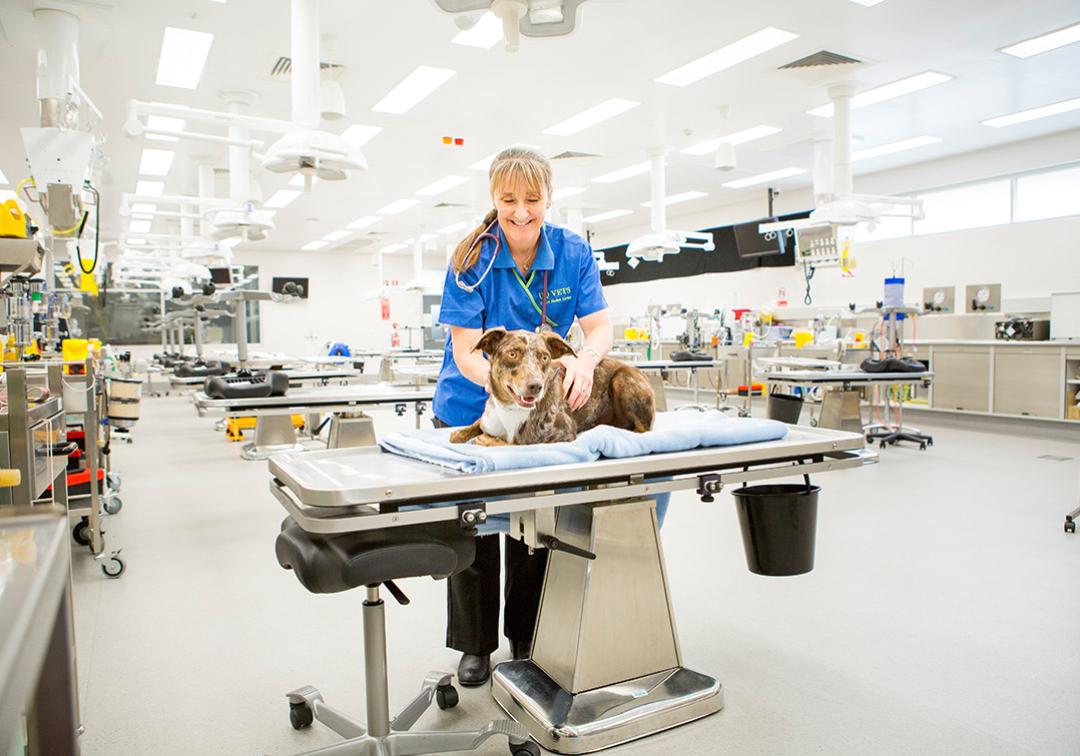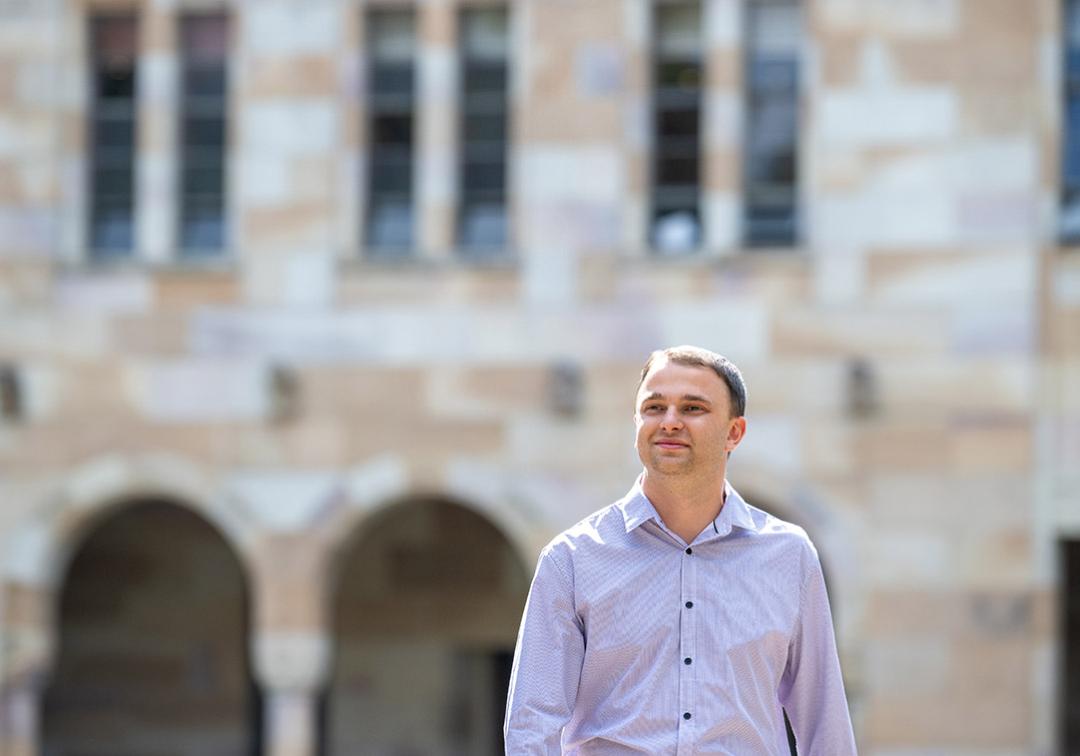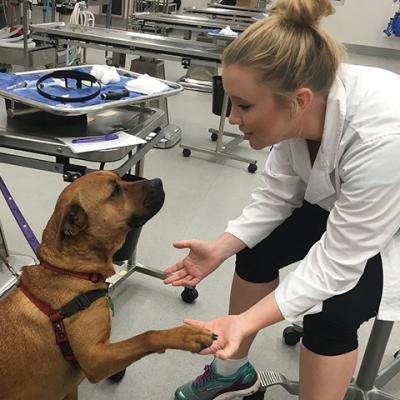
Bachelor of Veterinary Technology
Overview
Equip yourself with the theoretical and practical skills for a rewarding career as a para-veterinary healthcare specialist, working in animal health and welfare.
In the Bachelor of Veterinary Technology, you'll study basic sciences (chemistry, biochemistry, mathematics), animal handling and care, welfare and behaviour, applied and clinical nutrition, mechanisms of animal disease and diagnostic techniques. You'll also learn about clinical aspects of small and large animal health, therapeutics, surgical and medical nursing principles, and veterinary practice management.
As you progress through the program, you can choose from a wide range of elective courses including agribusiness, equine science, wildlife science and animal production. You can also enhance your skills by concurrently enrolling in the Certificate IV in Veterinary Nursing, the Certificate III in Rural Operations or the Farm Ready program.
You'll graduate with the skills and knowledge to pursue a career in a broad array of industries including clinical, commercial, research, education, diagnostics, zoos, poultry, cattle and horse enterprises.
The Bachelor of Veterinary Technology may be used as a pathway into the Bachelor of Veterinary Science (Honours) program.
Program highlights
- Learn from internationally regarded academics in the world-class animal health facilities at UQ’s Gatton campus.
- Gain veterinary industry expertise, as well as critical thinking, problem-solving and self-directed learning skills.
- Benefit from practical sessions and off-campus studies throughout the program, including a total of 19 weeks on clinical rotation and placement in your third year.
- Graduate well-prepared for supervisory and management roles in a range of animal-related fields.
How you'll learn
Your learning experiences are designed to best suit the learning outcomes of the courses you choose.
- Lectures
- Tutorials
- Work placements
- Online study
- Research experience
- Laboratory work
- Fieldwork
- Workshops
What you'll study
At UQ, degrees are called 'programs' and subjects are called 'courses'. Here's a sample of the courses you could study in this program:
- Applied Animal Biology
- Applied Animal Physiology
- Professional Studies for Veterinary Technology
- Surgical Principles and Practices
Career possibilities
Our programs prepare you for your first job and beyond. Here are some of the careers you could be on your way to:
- Veterinary technician
- Laboratory technician
- Production processing technician
- Veterinary pathologist
- Quality assurance officer
- Veterinary nurse
- Biosecurity officer
- Veterinary clinical nutrition technician
- Veterinary pharmaceutical representative
- Clinical academic
Next steps after graduation
As a para-veterinary healthcare specialist, you’ll be equipped with critical thinking, problem-solving and self-directed learning skills that can be applied to supervisory and management roles in a range of animal-related fields and industries including:
- Research
- Biosecurity
- Government departments
- Animal Management for local councils
- Higher education
- Vocational training and education
Undertaking an honours year in either a research or clinical stream could lead you to postgraduate studies.
Events
See all events
8 May
Discover Postgraduate Agricultural and Animal Science
Stories
See all stories
Study tips
How to identify the best veterinary universities in Australia

Uni life
What’s it like to study agriculture, environment and sustainability as a postgraduate?
Stories
See all stories
Study tips
How to identify the best veterinary universities in Australia

Uni life
What’s it like to study agriculture, environment and sustainability as a postgraduate?
Entry requirements
Prerequisites
- General English subject (Units 3 & 4, C)
- General Mathematics or Mathematical Methods (Units 3 & 4, C)
Prerequisites
- General English subject (Units 3 & 4, C)
- General Mathematics or Mathematical Methods (Units 3 & 4, C)
Entry score threshold
| ATAR / Rank | IB |
|---|---|
| 75 | 26.5 |
These are the lowest adjusted scores we made an offer to in Semester 1, 2024. Entry scores are based on the most recent Semester 1 intake and are updated in April each year. Meeting the entry score threshold doesn't guarantee admission.
Guarantee your place at UQ: If you meet our guaranteed minimum ATAR you could secure an offer for your preferred program.
English language requirements
IELTS overall 6.5; reading 6; writing 6; speaking 6; listening 6. For other English Language Proficiency Tests and Scores approved for UQ
TOEFL iBT (including Paper Edition) - Overall 87, listening 19, reading 19, writing 21 and speaking 19.
PTE Academic - Overall Score of 64 and 60 in all sub bands.
BE - A minimum overall grade of 4 plus a minimum grade of C in all macro skills.
CES - Overall 176 and 169 in all sub bands.
OET is not accepted.
There are other ways to meet the English language requirements. For some programs, additional conditions apply.
Student visas
International students who are accepted into full-time study in the Bachelor of Veterinary Technology are eligible to apply for an Australian student visa (subclass 500).
There are a number of requirements you must satisfy before a visa is granted, including the Genuine Student (GS) requirement.
Entry score range
This table shows the range of entry scores for recent secondary students offered a place in the B Veterinary Technology for Semester 1, 2024
| Without adjustments | With adjustments | |
|---|---|---|
| Highest | 98.65 | 99.95 |
| Median | 84 | 85.25 |
| Lowest | 70.35 | 75.2 |
Need help meeting the entry requirements?
Additional application information
Additional application information
Fees and Scholarships
Indicative annual fee
Approximate yearly cost of tuition (16 units). Your fees will vary according to your selected courses and study load. Fees are reviewed each year and may increase.
$6,934
2024
$6,934
2024
Approximate yearly cost of tuition (16 units). Your fees will vary according to your study load. Fees are reviewed each year and may increase.
AUD $48,160
2024
AUD $48,160
2024
Government assistance
Financial aid
As an international student, you might be eligible for financial aid – either from your home country, or from the Australian Government.
HECS-HELP
Domestic places in the Bachelor of Veterinary Technology are Commonwealth Supported. This means the cost of your education is shared between you and the Australian Government.
Instead of tuition fees, Commonwealth Supported students pay what are called student contribution amounts.
HECS-HELP is an Australian Government loan scheme to assist eligible students with the cost of their student contribution amounts.
Centrelink support
The Australian Government offers a number of income-support payments to eligible Australian university students.
Scholarships
You may be eligible for more than 100 scholarships, including:
How to apply
Applying online
If your senior schooling is from outside Australia, you can submit your application to UQ. Or, if you prefer, you can use an approved UQ agent in your country.
The program code for the Bachelor of Veterinary Technology is 2387.
Find out more about applying for undergraduate study
If your senior schooling is from Australia
Submit your application to the Queensland Tertiary Admissions Centre if you're an international student who is currently studying:
- Australian Year 12 (in Australia or another country), or
- the International Baccalaureate in Australia.
The QTAC code for the Bachelor of Veterinary Technology is 787309.
Applying through QTAC
All domestic applications should be submitted to the Queensland Tertiary Admissions Centre (QTAC).
The QTAC code for the Bachelor of Veterinary Technology is 787309.
Important dates
If you’re studying Year 12 in Australia, go to the QTAC website to check the closing date for this program.
If you’re applying to UQ, the closing date for this program is:
- To commence study in semester 1 - November 30 of the previous year.
To learn more about UQ dates, including semester start dates, view the Academic Calendar.
Important dates
To check the closing date for this program, go to the QTAC website.
To learn more about UQ dates, including semester start dates, view the Academic Calendar.
Admissions schemes
Applying to university can be both exciting and daunting, which is why we’ve tried to make the process as simple as we can.
We have several schemes in place to improve your chances of getting a place at UQ.
Pathway options
A rank or score doesn’t determine your potential.
If you're not offered a place in your first-choice program – or if you don't meet the entry requirements – you still have a number of options.
Aboriginal and Torres Strait Islander applicants
For support with applying – or if you have any questions about university life – get in touch with our Aboriginal and Torres Strait Islander Studies Unit.
Explore other programs
Express yourself. And your interest.
They say choosing a degree is hard, which is why we've made it easy. Register your interest and we'll send you everything you need to know about applying to UQ.






